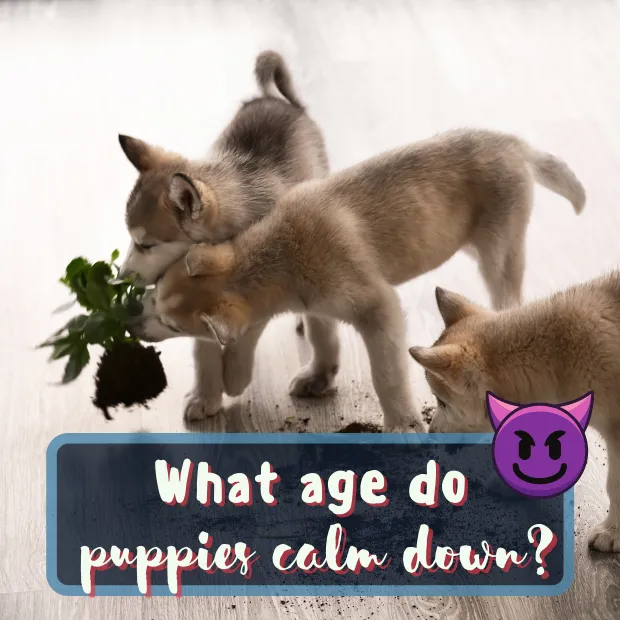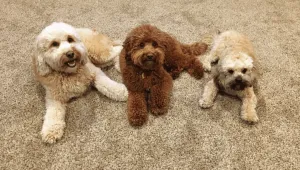It’s no secret that puppies are a handful. They’re full of energy, playfulness, and curiosity, which can sometimes result in mischief. At various stages, many pet parents find themselves asking “When do puppies get easier?”
But at some point, every puppy grows up and becomes a calm, adult dog. So, when DO puppies calm down?
Table of Contents
ToggleContents of this article:
- What causes high activity levels in puppies?
- When do puppies get easier?
- How can you calm a puppy down?
- Conclusion – When do puppies calm down?
What causes high activity levels in puppies?
There are several factors that contribute to how quickly a puppy calms down. These include breed, health, socialization, and training.
Some puppies may show signs of calming down as early as 6 months old, while others may take up to 2 years to reach full maturity.
In this article, we will explore in turn each of the factors that influences the age at which a puppy calms down.
Breed and genetics.
One of the biggest factors that determines how quickly a puppy calms down is breed and genetics.
Some breeds are naturally more active and playful than others, and this trait is often passed down from generation to generation.
Whether your puppy comes from a working line of their breed or the show line can also affect how active they are.
For instance, there can be quite a difference in the energy and drive levels of a working line spaniel compared to a show line spaniel.
Dogs from working lines with high drive are at greater risk of developing behavior problems if there are no outlets for their natural instincts.
Early experiences.
If the mother of your puppy was stressed during pregnancy or during birth, this can result in the puppy being more high-strung and active.
This is because the puppy has been exposed to higher levels of the stress hormone cortisol, which can have a lasting effect on their behaviour.
This is why puppy mill dogs often have lasting behavioral issues, as they are often born into very stressful environments.
Puppies who are orphaned or separated from their mother at an early age may also be more active and high-strung, as they have not had the chance to learn important calming and socialization cues from their mother.
Health.
Another factor that can affect how quickly a puppy calms down is health.
Puppies who are in good health and have no underlying medical conditions will typically calm down more quickly than those who are not in good health.
If your puppy has any health issues, such as parasites or an underlying medical condition, this can result in them being more active and stressed.
This is because puppies with medical conditions often have higher levels of stress and anxiety, which can lead to higher levels of activity.
Socialization.
Socialization is another important factor in determining how quickly a puppy calms down.
Puppies who are well-socialized (exposed to a variety of people, places, and experiences from a young age) will typically calm down more quickly than those who are not well-socialized.
This is because socialization helps puppies to learn how to cope with new and unfamiliar situations, which can be stressful for them.
Training.
Last but not least, training can also affect how quickly a puppy calms down.
Puppies who are trained using positive reinforcement methods (such as clicker training) will typically calm down more quickly than those who are not trained using these methods.
This is because positive reinforcement training helps puppies to learn how to cope with new and unfamiliar situations in a positive way, which reduces stress and anxiety levels.
However, it’s important to remember that every dog is an individual, so even puppies from the same litter can have different activity levels.
When do puppies get easier?
Newborn to 10 weeks.
For the first few weeks of their life, puppies sleep a lot. They start to become more active at around 3 weeks old, and by the time they are 6 weeks old, they should be able to play for short periods of time.
10 weeks to 6 months.
Puppies can be a mischief at this age. They are more active and curious than they were before.
Puppies can rip your clothes, furniture, and even disobey you. They have a short attention span and frequently forget the rules and instructions.
To create desired behaviors and teach them how to learn, you should train them on a frequent basis at this age. Try to keep the sessions short—a few minutes at a time—and use treats, toys, or play as rewards.
Puppy teething usually begins around 4 months of age and lasts until the puppy is around 7 months old. During this time, the puppy’s baby teeth will start to fall out and be replaced by adult teeth.
Puppies may experience some discomfort during this process, which can lead to them chewing on objects in an attempt to relieve the pain.
Puppies should be provided with plenty of chew toys during this time to help redirect their chewing behavior. Chew toys can also help to massage your puppy’s gums to soothe them and promote healthy teething.
6 months to 1 year.
Puppies start to hit adolescence from around 6 months old. At this age, they might start acting out and testing their limits. They may seem to forget everything you have taught them and become difficult to train.
This is normal puppy behavior. Be patient and consistent with your training, and don’t give up. Remember, they will eventually grow out of this phase.
1 year and older.
By the time your puppy reaches 1 year old, they may be considered an adult dog. They might still have some energy to burn off , but they should be much calmer than they were as a puppy.
How can you calm a puppy down?
There are several things you can do to help calm a puppy down:
Exercise.
A tired puppy is a calm puppy. Make sure to provide your puppy with plenty of opportunities to burn off energy through exercise.
A good rule of thumb is to provide at 5 minutes of walking per month of age.
In addition to walks, a few minutes of playing tug, followed by a calming activity involving sniffing, licking or chewing will result in a tired and relaxed puppy.
Training.
Training can help your puppy learn how to cope with new and unfamiliar situations in a positive way, which can reduce stress and anxiety levels.
Training teaches them to focus on you and follow your commands, which can help to calm them down.
Socialization.
Socialization helps puppies to learn how to cope with new and unfamiliar people, animals, and situations. This can be done simply by exposing your puppy to new people and experiences on a regular basis.
Engage their senses.
Puppies have a lot of energy and can be easily distracted. To help them focus and stay calm, engage their senses with calming activities such as licking, sniffing and chewing.
Crate training.
One way to help calm a puppy down is by implementing crate training.
When done correctly, crate training can also help your puppy learn to be calm and quiet in their crate, which can provide them with a sense of security and comfort.
To crate train your puppy, start by gradually introducing them to the crate with positive reinforcement.
Once they are comfortable with the crate, you can begin closing the door for short periods of time while continuing to provide positive reinforcement.
Eventually, you will be able to leave your puppy in their crate for longer periods of time.
Check out my article on how to crate train your puppy.
When do puppies calm down?
Many puppies will typically start calm down around the 1-year mark, though this can vary depending on the individual dog.
To help calm a puppy down, exercise and training are key.
Socialization is also important for teaching puppies how to cope with new people and experiences.
Crate training can provide puppies with a sense of security and comfort, helping them to calm down.
Engaging a puppy’s senses with activities such as licking, sniffing and chewing can also be calming.
With patience and consistency, most puppies will eventually grow out of their hyperactive phase but it may take them up to two years of age.







